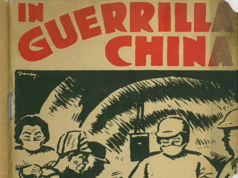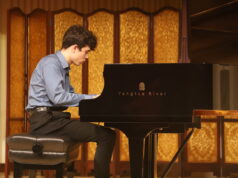The following are two reports on the first VICTour, which took place in October 2011, with the assistance and support of the National Chinese People’s Association for Friendship (Youxie). It was an initial tour, with a view to the Society promoting further similar ventures to enable English speakers to teach English in China, on a short-term basis.
The first report is by Jenevere Foreman, Chairperson of the VICTour committee (and President of Hamilton branch), the second is by John Meyer, a VICTour committee member (an Auckland branch member). The ‘guinea-pig’ group also included Murray Hoare, (then secretary of Auckland branch).
John Meyer’s report includes an interesting summary of the educational systems encountered in the Chinese schools visited.
It is worth noting that, while it was hoped that this tour would be the forerunner of future ongoing similar tours, one must quote Jenevere Foreman regarding the likelihood or otherwise of similar follow-up tours:
“This tour took some organising as just finding 3 weeks when there were no holidays, exam weeks etc etc proved to be very difficult. So I doubt if there would be another tour unless one finds a school with the money and time. [Organising] University teaching was much easier.”
So, unfortunately, VICTours can be considered (as of 2014) to be in limbo.
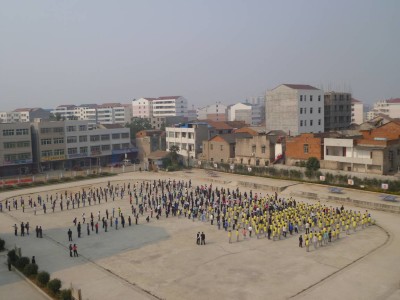
Report 1 – Jenevere Foreman
In November 2010, Mme Li Xaolin, the then Chairperson [in 2014, President] of Chinese People’s Association for Friendship with Foreign Countries (Youxie), suggested that volunteer teachers would be most welcome in her father’s village.
This was a very welcome initiative because the Chinese Government no longer grants a work permit to foreign teachers over the age of 60 [Editor’s note: Indeed, no teacher whether Chinese or foreign strictly can work as a teacher in China…]. This seems a pity as there are a number of teachers over the age of 60 who would be ideal for the job and who have the free time to spend teaching in China. This resulted in a new project for the Society called VICTour [Volunteer teaching In China Tour].
An NZCFS sub-committee was set-up to investigate the possibilities of this project. Chairperson was myself, Jenevere Foreman, and committee members were George Andrews, Judy Livingstone and Maurice Alley.
Thus the VICTour idea was circulated to all branches.
Emails were sent to Mr Qing Boming (Director of the Oceania Division in Youxie), who, in turn, was the go-between between us and Mme Li Xaolin. He replied that three teachers would be welcome for the first year and the teaching would be for 2 weeks, but weekends would be free. A 3rd week – a tour of the local area in China,would be our ‘payment’. Of course, bed, board and travel within China would be provided. As usual with trips organised by Youxie, we were to pay for our airfares to China.
National holidays are unsuitable and there were sufficient of those in China to make it difficult to find a ‘slot’. However, a clear 3 weeks between holidays was found in October after National Day.
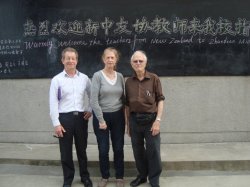
The three teachers chosen for the pilot tour were Murray Hoare, secretary of Auckland Branch, John Meyer, member of the Auckland Branch and myself, Jenevere Foreman, President of the Hamilton Branch and Member of the National Executive.
In Hubei, Changfeng Village
We were met in Wuhan by Elvis Hu from the Foreign Affairs Office of Hubei Provincial People’s Government and driven North to Changfeng village, Hong An County, and the Li Xiannian Memorial House, which would be our accommodation for the next week. Fang Siquan, the director, said the house was Li Xiannian, who was Li Xiaolin’s father. He was a famous general during the revolution, a Minister of Finance in the PRC Government and subsequently President of the PRC. So we felt indeed privileged to be guests there.
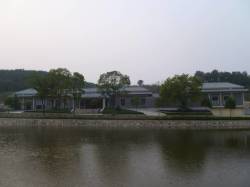
Fang Xi , the daughter of the director of the Li Xiannian Memorial House, was our interpreter who proved to be wonderful company and now a true friend. Fang Xi (or Sunny as she preferred to be called), was in her last year as an English major at Wuhan University. She did not have to attend university till December so was able to use her interpreting skills with us, and at the same time improve her English.
Teaching:
Each day we were driven to Gaoqiao (高桥 “high bridge”) Town. On the first day, we all arrived at the Middle School to a warm welcome and one of the teachers was assigned to us as our liaison person. For the first two days, John attended the Primary School while Murray and I attended the Middle School.
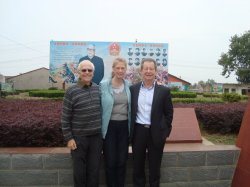
The normal school day for us was 2 classes in the morning and 1 class in the afternoon, with class sizes being 40 + and ages ranging from 13-17 in grades 7-9. The school year started on September 1st, so the Grade 7 students had had only 6 weeks of English lessons before we arrived. We had to speak slowly and use the blackboard to emphasise pronunciation. Correct pronunciation was insisted upon and we gave the students a lesson about New Zealand having taken with us material relating to NZ.
The teachers in general asked if we could emphasise how important English is for the students’ future. Being in the rural area, some students couldn’t see the importance of English, as their future was in farming.
Each of us had our own way of approaching the classes so there was no formal lesson plan. We found the students attentive and well-behaved and we were overwhelmed by their keenness to talk to us and have their photographs taken and we signed our names hundreds of times in text books or on pieces of paper.
The school had student and teacher boarders, who all went to their rural homes in the weekends.
The first Saturday we spent with Fang Siquan’s wife and daughter, Sunny. We spent most of the day in a mountain area and attended a service at a Buddhist temple.
On Sunday we were taken to the 140,000 Martyrs’ Park and the museum dedicated to Li Xiannian.
Hong An County city (the 2nd week).
On Monday morning we were driven to a hotel in Hong An County city – our rooms for the next week. We were then taken to No. 3 Middle School and after lunch we persuaded Mr. Liu, teacher in charge of the English Department, that we would like to teach a couple of classes… This school had a roll of 3000 students and 300-plus teachers, 100 of which took the English classes! The school was rather lopsided in the gender roll with 2000 boys and 1000 girls. The grounds were well kept with a running track between the classroom and the administrator’s block. Teaching blocks were up to 5 storeys high with no lifts! Quite an effort was required on our part!
No 2 Middle School is considered the best in Hong An County with over 6000 students and 400 staff.
We had 2 classes in the mornings and 1, or sometimes 2, in the afternoon. However, the class sizes were large with over 100 students! So, you can imagine how cramped we were…! The teachers were keen to have us in their classes and sat at the back with other teachers or in the aisles, translating to the class when necessary.
We had an entertaining last dinner on Friday night with the Director of the Education Department, his daughter and some of the teachers from No 5 Middle School.
Because the school system is geared to pass exams, the curriculum is well in place and strictly adhered to. After a couple of days we realised that we were taking up special teaching time and appreciated being able to contribute to the students’ needs.
Being a rural area, the schools have teaching staff and student boarders. At No. 5 Middle school and probably the others, boarders are up at 5.30 am. School starts at 7.30 am and finishes at 9 pm. Homework is done after that, so the days are long for all! Friday is a half day as the students and teachers go home for the weekend – though the students still have homework to do! Those teachers who live in the city either ride a motorbike or bicycle to school, as very few have cars.
No. 2 Middle School has employed foreign teachers in previous years, but we were advised there were no funds to employ teachers this 2011/2012 school year. The school libraries were for reference reading only.
Before leaving Wuhan on the 24th October, we were entertained by the Hubei Provincial People’s Association for Friendship with Foreign Countries. Mr Gao Zuoyin, Vice-Secretary-General, was our host at a banquet dinner.
From Saturday 22nd to 29th October, we were taken on a tour of many wonderful places in Wuhan and North East of Wuhan.
In Wuhan:
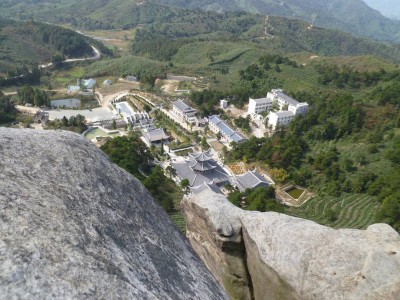
- Memorial to the Wuchang Uprising of the 1911 Revolution
- Yellow Crane Tower
- Wuhan Botanical Garden
- Hubei Provincial Museum
- East Lake
- Chu Han Street commercial centre
- Hankou District – Jianghan Road ‘walking’ street
From Yichang, by boat:
In Jingzhou:
- Jingzhou Museum
- View the city wall
In Shiyan:
- Wudang Mountain Scenic Zone
- Golden Top Taoist Temple
- Purple Heaven Palace
- South Hill
In Suizhou:
- Suizhou Hot Springs
As you can probably imagine, we enjoyed ourselves tremendously. What a stunning reward we were treated to!
For us, the experience of being with young enthusiastic young people was heartwarming. We were warmly welcomed everywhere by students and teachers alike and we felt they appreciated the opportunity to talk to native English speakers. If we have helped in any way to encourage the students to study hard to learn English, then our visit was worthwhile. We would, however, appreciate feed back from the schools and Hong An County Board of Education Board as to whether we made a difference to their school and if they would request another tour.
We would readily encourage another group to teach in rural areas, as an ongoing society project.
Jenevere Foreman (Chairperson, VICTours), April 2012
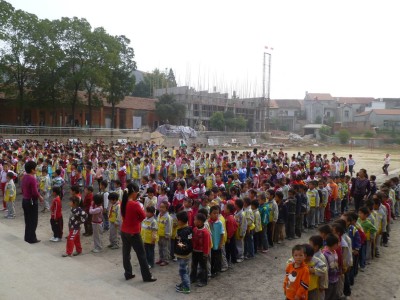
Report 2 – John Meyer
I was privileged to be given the opportunity to participate in a teaching programme in Hong’an County, Hubei Province, China for two weeks, followed by touring and visiting scenic sites. The forward thinking and building of relations between NZCFS, and thus with some aspects of New Zealand society, is to be warmly commended. On a personal level and within the exchange group, this was much appreciated. As a pathfinder programme this presents an opportunity to build on and further develop the structures supporting it in the future, in order to maximise the benefits to the schools and the teachers and pupils involved.
From the limitations of the short period and the small range of schools which we attended, the following is a broad, very generalised summary of the education system in the schools we visited as I saw it. In many cases it opens up more questions than it provides answers for.
Education is much more “mass produced” in China because of the student numbers and the range of cultural differences throughout China, with progress subject to examination. So each class had a range of chronological ages reflecting this exam-promotion policy. There seemed to be a variation between either mid-term and final exam each term, or exams set on a monthly basis. I wasn’t able to ascertain whether each grade has the same exam set school-wide and text-book related. Also to what extent and at what level(s) there were any National check-point exams. Because of the marking load we saw examples of pupils assisting in the process, which may be because of the nature of the answers required.
Education seems to be much more widely appreciated than in New Zealand. There is a compulsory core examination curriculum of maths, chemistry, politics, geography, Mandarin, English, physics, history and biology, with music, art and sports/PE non examination subjects.
While there are variations within the educational system, there seem to be two semesters per year in the primary/middle school system, from February to June (Spring semester) and September to January (Autumn semester), with a total of approximately 5 months per semester. There are variations in the times of the school day which are dependent on the semester, to accommodate the very hot conditions in the middle of the day in the summer. In the cooler semester, there is a shortened lunch period. In the so-called Spring semester, the school day starts with a “pre-school” programme, with the morning school proper then running from about 8 a.m. till noon and pupils having lunch to approximately 2 p.m. Afternoon school then runs from 2 p.m. to 5 p.m. and for the senior classes there can then be a further hour’s study after the evening meal. There are some variations in these times between different schools.
Quite a number of the pupils, both boys and girls, board in the establishment, with school finishing mid day on Friday to enable them to return home for the weekend. Local pupils go home for lunch or buy a meal off street vendors, and similarly at the end of the afternoon school. Additionally, quite a number of staff members live adjacent to the school buildings. Very few staff have cars, with some having scooters (often electric).
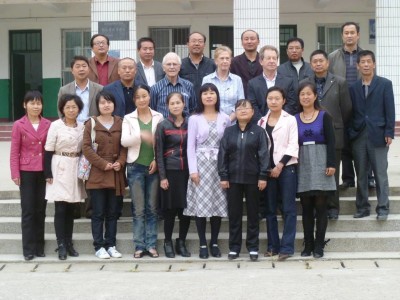
Although there is a one-child-per-family policy, from the limited examples we saw many pupils in the rural and smaller urban areas seem to have brothers and sisters but whether this is due to terminology differences would require further study [Editor’s note: Rural and ethnic minority parents can have more than one child. Also, in urban areas, if both parents are themselves ‘single’ children, they can have a second child]. One young Chinese woman called me “grandfather” which I am, but not hers. I was quite happy to answer to this as some of the terms reflect the age-cultural structure of the society, although this is changing with modern technology and other economic factors. Teachers’ families are easily monitored to conform to the one-child policy.
Classes vary considerably in size, over a hundred Grade 9 pupils being the largest I was involved with! Newly qualified teachers seem to have smaller classes. The informal survey of the system that I was able to do indicated that most classes reflect the demographic by having more boys (sometimes considerably so) than girls.
While schools are obviously different from those in New Zealand, one similarity, from the sample we visited, was the further up the educational level the more broad-based the support for it appeared to be. While some of the larger classes had a microphone head-set to enable the teacher to communicate more clearly, there didn’t seem to be very much audio-visual equipment and limited wall displays.
There is a series of text books of carefully graded progressive lessons, in much the same way as Mandarin texts teaching their language to us have the topic vocabulary and associated grammar.
Learning seems to be by rote-repetition in the main. We only saw one teacher teaching – a critique lesson for her appraisal, which she did in a very well prepared, step-by-step progression.
There seems to be a variation in the quality of the teachers’ spoken English, which might reflect the location of the schools (rural or small urban), the teacher’s training in the English language, and, with the younger teachers, could reflect the benefits of the increased emphasis given to English in the course they came through as students in the system. I took some basic speech training with some of the classes and this needs to be included in the teaching process.
However, I have only admiration for the way in which the teachers overall are addressing the teaching of English, and am very pleased to see the place English has in the school curriculum.
As an aside, we did make a list of suggestions for items recommended for subsequent VICTour teachers to take: this included personal toiletries, perhaps not routinely provided, and also a list of suggestions for some of the types of educational support, albeit some of only a minor nature. We passed both lists to Jenevere.
On a personal level, although I have been to China a number of times, I haven’t had the individual and institution-based contacts that the other two members of the group have had. My previous visits were only in tour groups , which had been organised through Kunming Botanic Institute with Pukeiti Rhododendron Trust (New Plymouth and Kunming being sister cities).
The important part that history, trade, religion, culture and peoples have played in China’s past and shaping the present was brought much more to my notice. The pace of change and progress in the development of infrastructure in areas such as construction, industry, transport and urbanisation is so massive and widespread that it is difficult for us to grasp, both its intensity and its world-shaping importance.
I am very grateful for having had the opportunity through the invitation extended to us by Hubei to participate in this programme, and see the friendliness of the Chinese people to us. Special thanks to those at the Li Xiannian Home base for their kindness and friendliness in welcoming and hosting us initially, and to the hierarchy and staff of the schools we attended and for their patience with us, and to those who drove us on our scheduled programme. This hosting and courtesy was continued through the Hubei Province, Hong’an County, Hubei Foreign Affairs Office liaison overseeing the arranged touring which we did in the final period of our stay.
My personal thanks to those who, in one way or another, contributed to making our stay a very friendly, interesting and worthwhile time, including the well chosen trips and visits. My thanks also to the others in our group for a supportive and congenial time.
– John Meyer


